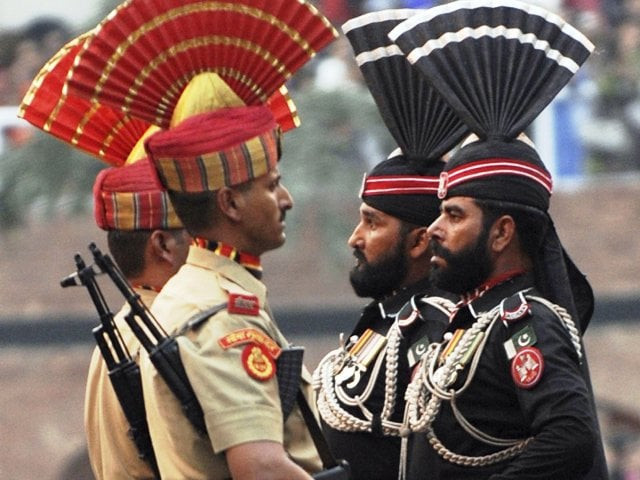'For all the chest-thumping, India can't win a war against Pakistan'
Ex-Indian army officer Raghu Raman writes that era of 'decisive' short wars, especially in Indo-Pak context, is over

The columnist and author who has also served as a UN Peacekeeper, wrote: "For all the xenophobic war mongering touted in every medium, India cannot not win’ a war against Pakistan and the sooner we appreciate this politico-military reality, the more coherent and serious we will sound to our adversaries and the world community. The demands for a ‘once and for all’ resolution of Kashmir/Pakistan emanating from several quarters, which surprisingly includes some veterans – equating India’s non-retaliation with impotence – perhaps don’t factor the larger picture and the stark truth of modern military warfare."
Raman opined that as a matter of fact, short of total genocide, no country regardless of its war-withal could hope to achieve a decisive victory with a “short war” in today’s world.
CPEC may further ignite India-Pakistan tension: UN report
"As the US is discovering eight years, trillion dollars, and over 25,000 casualties later—in Afghanistan. That era of 'decisive' short wars, especially in the Indo-Pak context, is largely over because of several reasons," he noted.
"Firstly, the much vaunted Indian military superiority is largely an accounting subterfuge. Sure we have more soldiers, tanks, aircraft, and ships than Pakistan, but banking on mere numbers is misleading and irrelevant in military strategy."
The former Indian soldier noted that Pakistan and China had achieved military interoperability, which was the capability of their two armies to execute joint missions against a common target. Decades of mutual cooperation, technology transfer, training, equipment sales, and of course a common enemy, have welded our two adversaries into a formidable joint force. Pakistan’s accelerated achievements in nuclear technology, missile delivery systems, logistic supply chain of equipment, and spares as well as new-age technologies such as cyber and drone warfare are all the result of cooperation between the two countries.
In contrast, India has not even been able to integrate its three services, what to speak of assimilation with political leadership, industry, academia and indigenous defence capabilities. As Praveen Sahwney points out in his book “The Dragon on our doorsteps,” India has primarily focused on developing its military arsenal whereas Pakistan and China have been developing war waging capabilities, which is a synthesis of many strengths other than just military force.
Secondly, Raman observed, Pakistan had leveraged its geopolitical position far more strategically than India had been able to.
"Russia, our traditional all-weather friend, has far greater bonhomie with both the US and China than ever before," he wrote. He noted that the US needed Pakistan to achieve closure in Afghanistan and had no choice but to continue supporting it financially and militarily. On the other hand Pakistan’s dependence on the US has reduced dramatically with China filling in the gap.
India considering ‘punitive actions’ against Pakistan: claims US official
"China’s One Belt One Road (OBOR) project coursing through the length of Pakistan has pretty much made the two permanent partners. China’s economic aspirations and access to the Arabian Sea through Balochistan ending at Gwadar port is a strategic masterstroke by Pakistan and China. Not only is it a win-win for them but it is also a “lose-lose” for India for many reasons."
Raman wrote that the only area where India could try a meaningful riposte would be Balochistan. "By tying in China’s stake of keeping Balochistan under control, Pakistan has made it extraordinarily difficult for India to make any aggressive move in its south without threatening Chinese interests. The same is true for any Indian military action in the theatres of Kashmir or Punjab. Any Indian operation that endangers thousands of Chinese citizens working on the CPEC project in Pakistan will draw the wrath of China and give them the loco standi to initiate hostilities against India. So beyond shallow skirmishes all along the border, India really has no operational or strategic options without the risk of drawing China into a two-front war."
Pakistan has correctly appreciated that the force levels which India will be able to muster against it will be more or less evenly matched, and in the event of Indo-Pak hostilities, they can depend on China for their logistics supply chain as well as splitting the Indian armed forces’ resources and focus by mobilising PLA divisions along the border with India. This would in effect, pin down a substantial part of the Indian Army’s reserves to cater for the eastern front.
Also, now there too many stakeholders dependent on the success of the OBOR/CPEC project and any disturbance in this area would be attributed to India’s truculence.
So, rather than looking like the visionary big player in the Asian growth story, India is at the risk of being perceived as the obdurate party incapable of setting aside bilateral issues for the larger good of the region. And with dark clouds hovering over their own respective challenges, none of the world’s major powers, the US, UK, Russia or France, will have the gumption to interfere militarily in an Indo-Pak conflict that has the potential to draw in the fifth permanent member of the UN Security Council.
Chinese daily blames rising Hindu nationalism for India's OBOR summit absence
"Politically too, India is in no position to consider a short war," Raman maintained.
The current political dispensation is only just gathering momentum on its electoral manifestoes, the lynchpin of which is economic development. That necessitates a stable and peaceful environment. War clouds are an antithesis for economic investments. Even preparation for war costs billions of dollars in terms of resources and mindshare, a diversion that India can scarcely afford when millions of youth are entering the job market whose un-channelised energies is another potential risk."
Raman concluded: "For a nation to go to war, all its pillars of strength, including its military, economic prowess, industrial capability, external alliances and national will must be aligned in a singular direction to achieve meaningful success. War waging is not about bombastic threats, surgical strikes, cross-border firing or clamorous bellowing on TV channels. That is called letting off steam. There is an old couplet by Ramdhari Dinkar which suggests that forgiveness befits a snake which has venom in its bite—not one which is weak, toothless, and harmless. To be taken seriously, India needs to build that strength first rather than spewing ineffectual rhetoric."


















COMMENTS
Comments are moderated and generally will be posted if they are on-topic and not abusive.
For more information, please see our Comments FAQ